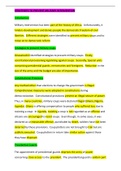STRATEGIES TO PREVENT MILITARY INTERVENTION
Introduction
Military intervention has been part of the history of Africa. Unfortunately, it
hinders development and denies people the democratic freedom of civil
liberties. Different strategies were identified to prevent military coups and to
move on to democratic reform
Strategies to prevent military coups
Onwumechili identified strategies to prevent military coups. Firstly,
constitutional provisioning legislating against coups. Secondly, Special units
comprising presidential guards, mercenaries and foreigners. Reduction in the
size of the army and the budget are also of importance.
Constitutional Provisions
Any method other than elections to change the government is illegal.
Comprehensive measures were adopted in constitutions during
democratization. Constitutional provisions prevent an illegal seizure of power.
Thus, in many countries, military coups were declared illegal (Ghana, Nigeria,
Uganda). Ghana is offering compensation to people who suffered loss due to
resisting a coup. In Uganda, resisting a coup is not regarded as an offence and
citizens are encouraged to resist coups. Even though, in some cases, it was
declared as a treasonable offence, punishable by death, soldiers have not been
deterred by these provisions. Coup plotters are not brought to trail but are
publicly executed. Coup plotters in return take similar action against those
they have disposed.
Presidential Guards
The appointment of presidential guards deprives the army of power
concerning close access to the president. The presidential guard is seldom part
, of national army and their task is to guard the president. They owe their
loyalty more to the president than to the country, thus would think twice to
overthrow the government via a coup. In some countries, eg Uganda, the
president’s (Amin) guards consisted of people of his own ethnic group, making
it less likely that they would oust their own kinsman. Nevertheless, it failed to
prevent a military takeover in may African countries
Omwumechilli believed Foreign troops or mercenaries would be better
presidential guards, due to the fact that they only have one obligation, namely
to protect the president. Their loyalty is to the president who is paying their
salaries. French troops based in Africa have on a number of occasions come to
the assistance of leaders threatened by a coup. These French troops are based
in Gabon, Ivory Coast and Senegal
Dismantling/military re-organisation and democratic control the army
It can be argued that the army must be dismantled to prevent coups. The
money used for the Army could be used for economic development. A few
African countries are involved in cross-border disturbances, crisis and wars.
Inland, Armies are used for police actions, thus duplicating duties of armies
and police.
On the other hand, it can be said that dismantling the army could leave you
vulnerable if the situation change and cross border wars were experienced.
The future can change and cross border wars cannot be easily predicted. The
army is also needed for a lot of reasons.
Instead of dismantling, reduction is also an option because big armies are
difficult to control. In SA, SADF was changed to SANDF, integrated various
armies. The old army was perceived to be partisan, defending the ideology of
a political party, a tool for white domination.





